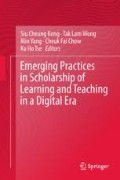Abstract
This chapter contributes to knowledge about the relationship between service-learning and undergraduates’ personal development, particularly in the areas of self-management and self-awareness. Students who enrolled in cocurricular learning courses in 2014–2015 at the Education University of Hong Kong were invited to participate in the study. Pre- and post-test surveys were administered to track participants’ development of self-management ability and self-awareness during the course of a semester. It was found that cocurricular activities adopted in the courses, regardless of service or non-service-learning in nature, have helped to improve undergraduates’ self-management abilities. However, students’ self-awareness abilities remained unchanged. Influential elements, namely meaningful experience, reflection, diversity, youth voice, and link to curriculum, were reported to have moderate or marginal correlations with self-management and self-awareness. Possible reasons and implications on the cocurricular course development were elaborated and discussed.
References
Almazroui, K. (2010). Improving students’ literacy awareness through service learning in UAE: Children’s language and activities bag (CLAB). Journal of Language and Literacy Education [Online], 6(1), 105–113.
Billig, S. H. (2009). Does quality really matter? Testing the new K-12 service-learning standards for quality practice. In B. E. Moely, S. H. Billig, & B. A. Holland (Eds.), Creating our identities in service-learning and community engagement (1st ed., pp. 131–158). Denver: Information Age Publishing Inc.
Bringle, R. G., & Hatcher, J. A. (1999). Reflection in service-learning: Making meaning of experience. Educational Horizons, 77(4), 179–185.
Brenner, B. R. (2003). A study of self-awareness, self-efficacy, and sojourner adjustment over time. Unpublished Ph. D thesis. Maryland: University of Maryland.
Bryant, J. A., Schönemann, N., & Karpa, D. (2011). Integrating service-learning into the university classroom. Sudbury, Massachusetts: Jones and Bartlett Publishers.
Buch, K., & Harden, S. (2011). The impact of a service-learning project on student awareness of homelessness, civic attitudes, and stereotypes toward the homeless. Journal of Higher Education Outreach and Engagement, 15(3), 45–61.
Byrne, D. A. (2009). The effects of service learning and reflection on the pre-service teacher education student’s emotional intelligence. Ph.D. thesis, Union Institute and University, 2009.
Corrigan, C. P., & Kwasky, A. N. (2014). Utilizing service-learning to promote a value based professional nursing curriculum. Creative Education, 5, 1848–1855. doi:10.4236/ce.2014.521206.
Deeley, S. J. (2015). Critical perspectives on service-learning in higher education. Basingstoke, Hampshire: Palgrave Macmillan.
Eyler, J., & Giles, D. E., Jr. (1999). Where’s the learning in service-learning?. San Francisco, CA: Jossey-Bass.
Govern, J. M., & Marsch, L. A. (2001). Development and validation of the situational self-awareness scale. Consciousness and Cognition, 10, 366–378.
Jacoby, B. (1996). Service-learning in today’s higher education. In: B. Jacoby and Associates (Eds.), Service-learning in higher education: Concepts and practices (p. 5). San Francisco: Jossey-Bass.
Jacoby, B. (2015). Service-learning essentials: Questions, answers, and lesson learned (p. 234). San Francisco, CA: Jossey-Bass.
Jones, S. R., & Abes, E. S. (2004). Enduring influences of service-learning on college students’ identity development. Journal of College Student Development, 45(2), 149–166.
Katz, J., DuBois, M., & Wigderson, S. (2014). Learning by helping? Undergraduate communication outcomes associated with training or service-learning experiences. Teaching of Psychology, 41(3), 251–255.
Kaye, C. B. (2010). The complete guide to service learning: Proven, practical ways to engage students in civic responsibility, academic curriculum, & social action (2nd ed.). Minneapolis: Free Spirit Publications.
Lagana, L., & Rubin, M. S. (2002). Methodological challenges and potential solutions for the incorporation of sound community-based research into service-learning. In A. Furco & S. H. Billig (Eds.), Service-learning: The essence of the pedagogy (pp. 161–182). Greenwich, CT: Information Age Pub.
Lee, D. (2010). International service-learning: A Singapore experience. In J. Xing & C. H. K. Ma (Eds.), Service-learning in Asia, Curriculum models and practices (pp. 127–141). Hong Kong: Hong Kong University Press.
Lin, C. Y., Wu, S. W., Wu, S. F., Pan, B. S., & Liao, H. C. (2014). Effects of service-learning in a University in Taiwan. Procedia - Social and Behavioral Sciences, 116, 902–906.
National Youth Leadership Council. (2008). K-12 service-learning standards for quality practice. Retrieved 12 Aug, 2014 from http://www.nylc.org/sites/nylc.org/files/files/Standards_Oct2009-web.pdf.
Ngai, S. S. Y. (2006). Service-learning, personal development, and social commitment: A case study of university students in Hong Kong. Adolescence, 41(161), 165–176.
Sato, Y., McCarthy, F., Murakami, M., Nishio, T., & Yamamoto, K. (2010). An appreciation of cross-cultural differences through international service-learning at International Christian University, Japan. In J. Xing & C. H. K. Ma (Eds.), Service-learning in Asia: Curricular models and practices (pp. 31–46). Hong Kong: Hong Kong University Press.
Stanton, T. K., Giles, D. E., Jr., & Cruz, N. I. (1999). Service-learning: A movement’s pioneers reflect on its origins, practice, and future. San Francisco, CA: JOSSEY-BASS.
The Hong Kong Institute of Education. (2014). Handbook and guidelines for co-curricular and service learning (CSL) courses (for 2014/15 cohort and onwards). Hong Kong: Author.
Vandenberg, B. (1991). Is epistemology enough? An existential consideration of development. American Psychologist, 46, 1278–1286.
Xue, G., & Sun, X. M. (2011). Construction and validation of self-management scale for undergraduate students. Creative Education, 2(2), 142–147.
Yang, S. H., et al. (2014). Service learning for medical students: Program development and students’ reflections. The Turkish Online Journal of Educational Technology, 13(1), 193–198.
Zimbardi, K., & Myatt, P. (2014). Embedding undergraduate research experiences within the curriculum: A cross-disciplinary study of the key characteristics guiding implementation. Studies in Higher Education, 39(2), 233–250.
Author information
Authors and Affiliations
Corresponding author
Editor information
Editors and Affiliations
Rights and permissions
Copyright information
© 2017 Springer Nature Singapore Pte Ltd.
About this chapter
Cite this chapter
Xu, H., Chan, J.KS. (2017). Developing Undergraduates’ Self-management and Self-awareness Abilities Through Service-Learning. In: Kong, S., Wong, T., Yang, M., Chow, C., Tse, K. (eds) Emerging Practices in Scholarship of Learning and Teaching in a Digital Era. Springer, Singapore. https://doi.org/10.1007/978-981-10-3344-5_11
Download citation
DOI: https://doi.org/10.1007/978-981-10-3344-5_11
Published:
Publisher Name: Springer, Singapore
Print ISBN: 978-981-10-3342-1
Online ISBN: 978-981-10-3344-5
eBook Packages: EducationEducation (R0)

